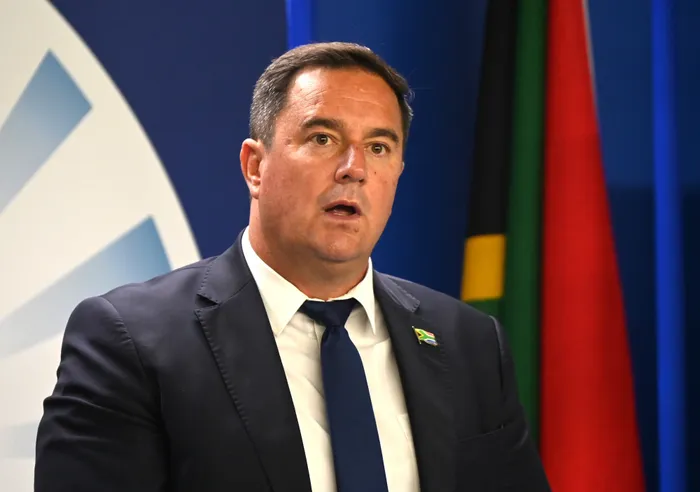Steenhuisen reveals GNU's purpose: Blocking EFF and MKP from power

DA leader John Steenhuisen's comments during the meeting between the South African government delegation and US President Donald Trump on Wednesday have been criticised for not adequately dispelling the notion of white genocide in South Africa.
Image: Ayanda Ndamane Independent Newspapers
DA LEADER and Agriculture Minister John Steenhuisen openly stated that the Government of National Unity (GNU) was created to prevent the uMkhonto weSizwe Party (MKP) and the Economic Freedom Fighters (EFF) from gaining access to state power.
This revelation was made during a high-profile meeting on Wednesday, where President Cyril Ramaphosa and his delegation, including Steenhuisen, met with US President Donald Trump at the White House.
During the meeting, Trump played video clips of EFF leader Julius Malema and former president Jacob Zuma, now the leader of MKP, chanting versions of the controversial anti-apartheid song Dubul’ ibhunu (“Kill the Boer”).
He questioned Ramaphosa on the issue of farm attacks, suggesting that white farmers were being targeted in South Africa — a claim that has long been politically charged and widely disputed.
Ramaphosa, instead of responding directly, deferred the question to Steenhuisen.
In his response, Steenhuisen referred to the EFF and MKP as “small parties” and openly stated, “We are in the GNU to keep EFF and MK out of the Union Buildings.”
His comments have sparked outrage from the MKP and the EFF – both very popular parties with massive support.
The MK Party's spokesperson Nhlamulo Ndhlela said Steenhuisen’s remarks confirmed what they had been claiming for months, that the GNU was a coalition formed for narrow political interests and did not have the interests of South Africans at heart.
“We have been saying for a long time that the so-called GNU is a coalition formed by self-serving politicians. It does not represent the will or interests of ordinary South Africans,” said Ndhlela.
The MKP, now the official opposition party in Parliament with 58 seats, was among the parties that opted not to participate in the GNU.
The ANC saw a dramatic drop in support in last year’s national elections — falling from 58% to 40%.
Faced with the prospect of losing power after the elections, the ANC went, hat in hand, to other political parties lobbying them to create a unity government, similar to that of the post-apartheid arrangement under President Nelson Mandela.
That historic GNU included figures like FW de Klerk and IFP leader Inkosi Mangosuthu Buthelezi. In contrast, the current version comprises ten parties, including the DA, that agreed to support the ANC’s weakened majority.
This alliance extended into provinces such as KwaZulu-Natal, which now operates under a Government of Provincial Unity (GPU) made up of the ANC, DA, IFP, and the National Freedom Party (NFP). Once again, the MKP, which is the biggest party in the province with 37 seats out of 80 in the provincial legislature, and the EFF, were notably excluded.
According to Ndhlela, the entire political arrangement is illegitimate. “This is not a unity government. It is a political pact meant to sideline real challengers and maintain control. The people will see through this,” he said.
The discussion on farm murders continues to be a point of contention in South African-American relations.
Trump’s administration has frequently raised concerns about alleged violence against white farmers and also offered refugee status to Afrikaner families.
However, only 49 families accepted the offer and relocated to the US. The South African government has repeatedly denied claims of racially motivated violence.
Wednesday’s meeting was viewed as a critical attempt by the Ramaphosa administration to repair its strained relationship with the US. Still, some say the cost of appeasing American interests may be too high.
The EFF, in a statement following the meeting, accused Ramaphosa of betraying South African values: “Ramaphosa abandoned South Africa’s sovereignty and constitutional principles to appease white monopoly capital and Western imperialism. Surrounded by elites like Johann Rupert and John Steenhuisen, he failed to defend a liberation song that our highest courts have upheld.”
Durban-based political analyst Thobani Zikalala argued that Steenhuisen’s remarks reflect a broader agenda. “To say the GNU exists to block the EFF and MKP is to ignore the democratic process. These are the third and fourth largest parties in the country. You cannot erase them from the political map,” he said.
Zikalala added that the DA’s approach reveals a desire to preserve the status quo: “This is about preserving white minority privilege. The DA has always been uncomfortable with any party that challenges that system.”
Meanwhile, economist Dawie Roodt commented on the mooted Starlink potential deal with South African-born billionaire Elon Musk. “If Starlink can be brought to rural South Africa, it could revolutionise connectivity and drive development. But if the US decides to impose sanctions or increase pressure, the economic fallout could be severe.”
DAILY NEWS
